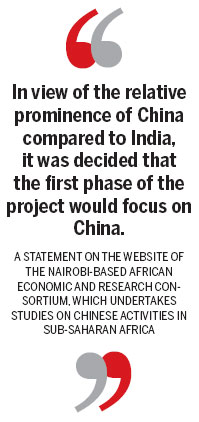
South African institutions cover most bases on China watch
Most of the dynamic institutions carrying out research into China and its involvement in Africa are based in South Africa, the continent's economic powerhouse, underscoring its academic aptitude and its higher-order engagement with China as a fellow member of the BRICS geopolitical organization.
Stellenbosch University's Centre for Chinese Studies and the South African Institute for International Affairs at the University of the Witwatersrand produce most of the research on Africa-China relations.
While CCS funding is mainly sourced from within Stellenbosch University and supplemented by other partnerships, the startup resources for SAIIA's China and Africa Project, established in 2007, came from the UK Department for International Development and the Swedish International Development Agency.
CCS has been exclusively devoted to Africa-China relations since 2004, initially as a Confucius Institute in partnership with East China's Xiamen University. SAIIA's China research on the other hand is largely an offshoot of its global powers and Africa initiative.
Between them, these two institutions have emerged as outstanding bases for Africa-China studies, having generated copious amounts of literature.
SAIIA's China and Africa project has published or participated in the publication of seven books covering Sino-African and sub-regional perspectives, Chinese relations with Mozambique and Angola, trade and economic matters, sociological and perception studies, in addition to hundreds of research papers. SAIIA also collaborates with the Wits China-Africa Reporting Project hosted by the university's department of journalism.

While CCS appears not to have published a conventional book on the topic, the center is head and shoulders above any other research outfit on the continent, if the number of research papers it has produced is considered criteria. Recently it re-invigorated its African East Asian Affairs and China Monitor, which is on course to become an invaluable resource on topical issues and an avenue for researchers to disseminate their findings. CCS is also unique in gathering and examining content on Africa-China dynamics, often embellished with quick, sharp commentary. Other notable research bodies include the South African Foreign Policy Institute, Martyn Davies' Frontier Advisory and the civil society organization, Fahumu.
Away from South Africa, one finds few research organizations focused on China with the single-mindedness of Stellenbosch or Witwatersrand. However, a number of institutions and individual researchers dabble in Africa-China research as part of their wider mandate. One is the Nairobi-based African Economic and Research Consortium.
Under the Export Supply Response Capacity Constraints project, AERC undertakes studies on Chinese and Indian involvement in sub-Saharan Africa, focusing on trade, investments and aid. Information on the consortium's website says: "In view of the relative prominence of China compared to India, it was decided that the first phase of the project would focus on China," leading to the publication of scoping studies for 21 African countries, from South Africa in the south to Nigeria in the north, and 15 framework papers, all accessible on its website.
The Council for the Development of Social Science Research in Africa, headquartered in Dakar, Senegal, has also emerged as an Africa-China research base. In 2011, it organized a conference in Nairobi titled "Towards a New Africa-China Partnership", which was attended by representatives of more than 50 African and Chinese research institutions, think tanks and government agencies. This resulted in the establishment of the African Forum for Study and Research on China and Africa-China Relations, which has since held two conferences.
In Ethiopia, the Institute of Peace and Security Studies of Addis Ababa University, strategically located at the headquarters of the African Union, was the venue for the second China-Africa Think Tanks Forum in October last year, attended by more than 80 participants.
In July this year, the University of Dar es Salaam hosted a conference titled "Chinese Dream, African Dream - Achieving Common Development through Joint Efforts", presided over by Lu Shaye, director-general of the African department of China's Ministry of Foreign Affairs. During the event, Dar es Salaam University's president, Rwekaza Mukandala, said he wanted his institution to re-invigorate a tradition of research on Sino-Africa relations, citing close historical links between the two countries.
It bears mentioning that most of the African research outfits have standing partnerships with Chinese research organizations and often get financial assistance from Chinese government agencies.
Notable among these Chinese research entities are Zhejiang Normal University's Institute for African Studies; Communication University of China's African Communication Research Center (in partnership with University of Nairobi's School of Journalism); Peking University's Center for African Studies; and the Chinese Academy of Social Sciences' Institute for West Asian and African Studies.
Other research entities that have strong links with African counterparts are the Shanghai Institute of International Studies, the China Institute for International Studies and the China Institutes for Contemporary International Relations.
For China Daily
(China Daily Africa Weekly 11/22/2013 page9)








 IOC President: China's bidding offers a new approach for the Winter Games
IOC President: China's bidding offers a new approach for the Winter Games Reforms to benefit foreign investment
Reforms to benefit foreign investment Navy special - part 4: Fun times aboard the Peace Ark
Navy special - part 4: Fun times aboard the Peace Ark Argentine FM points to advantages of deeper ties
Argentine FM points to advantages of deeper ties